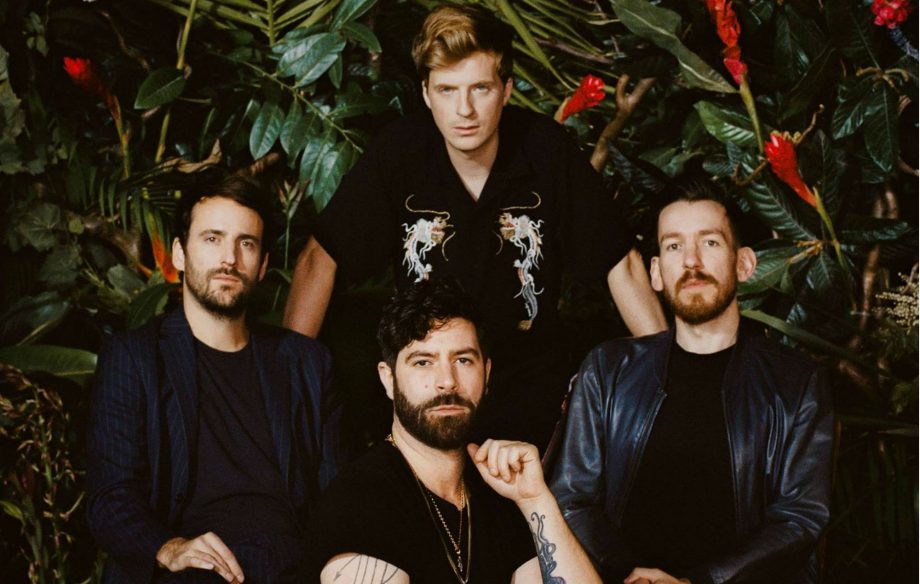Sounds of the Summer: Foals

It’s 6 p.m. on a Monday evening. The sun is setting over the Hudson River in Manhattan. And Yannis Philippakis is cracking open a Tecate. He’s had a long day—the Foals frontman flew in from London and only landed hours ago, threw his stuff in a hotel room and immediately came to talk about the band’s new album, Everything Not Saved Will Be Lost – Part 1. So, he’s earned the leg room that the lush couch he’s sitting on affords. Philippakis’ not drained by any means but still wastes no time getting into the big themes that present themselves throughout the album’s 10 tracks, using the word “dystopian.” He’s upset. The world isn’t great, and the band has dealt with that here.
“It’s all about the outside,” he says. “It’s about the preoccupations and frustrations that we all have—and the confusion unique to this current time. We’re one of the first generations that’s fearful of the future. I open a newspaper and I’m confronted with question marks of doom on many fronts, whether its environmental, political or social. It wasn’t a designed idea to write about all that on the record, but these are the neuroses that I have.”
The neurotic direction that Philippakis says Foals have taken may be new to him—but the English four-piece outfit have long instilled a sense of urgency in their music, dating back to the band’s 2008 debut, Antidotes. Over four albums, they’ve carved out a sound that combines powerful, angular guitars, catchy synths and African-inspired rhythms. But lyrically, Philippakis says he was always looking inward. “I wanted the lyrics to be abstract when I was younger and didn’t have much interest in engaging with big themes or the external context that much. I wrote in my own head.”
And that expanded sense of direction isn’t the only newness the band has confronted. Their longtime bassist, Walter Gervers, departed right before they started working on Everything Not Saved Will Be Lost and they hunkered down in South London for the first time to record. Since they didn’t use a producer, Philippakis took on those duties, too. And they didn’t go into the sessions with anything concrete to work with; day in and day out, studio jamming yielded the new batch of songs.
“We were capturing the first expressions of things and they made it through [to the final cut], which is something we’ve never done before and is relatively unusual,” he says.
Often, Philippakis would retreat to his local pub after recording, bringing along the days’ work for inspiration—and he’d sit by himself, headphones on, and write lyrics to what he was hearing. In the past, he admits, he was typically a ruthless self-editor in real-time, but, in this case, he just got everything out—and then would edit or rework as needed the next day.
In doing so, Foals have retained the elements that put them on the map, while pushing forward into those bigger thematic explorations. On the album’s groovy lead single, “Exits,” Philippakis declares, “They got exits covered/ All the exits underground/ I wish I could figure it out/ But the world’s upside down”—a juxtaposition of dance-driven arrangements with explorations of a gloomy world view. And on the ethereal “Sunday,” one of the album’s standout songs, he sings, “Through the flames and through the fire, cities burn/ We don’t give a damn ‘cause we got all our friends right here/ We got youth to spend.”
It’s this relentless devotion to their craft—along with a reputation for having a killer live show—that is likely the reason Foals have become one of the biggest bands in the U.K. this decade, headlining major U.K. festivals like Reading and Leeds. Here in the United States, they sold out three shows this spring at New York’s 1,800-person Brooklyn Steel. Philippakis knows that—in an industry currently dominated by rap, R&B and pop stars—it’s rare for a band to get this big and survive every other tumultuous turn during the last decade.
“It’s been hard for bands of a certain stature to make a living,” he says. “You can be making great art and well-received, acclaimed records, but that doesn’t often translate into keeping the band solvent. That has to do with the changing landscape of the music industry. In the U.K., there’s less and less venues to play on a small stage. There’s less and less record stores where you’d meet people. All of that has made an impact.
“But when bands are out of the commercial spotlight, often, more interesting records tend to happen,” he adds.
As the title of Foals’ new LP suggests, there is a second part due out this fall. The follow up is also 10 tracks and a complement to the first installment, but, according to Philippakis, it is much heavier. He admits that he hates double albums and likes the idea of giving fans 10 new songs, letting them sit with them, learn them, digest them—and then hitting them with 10 more fresh ones, six months later.
“We’ve exceeded those missions [of the early days] because they were pretty low,” he says. “All I wanted to do is put a 7-inch record out and play some shows. Part of what we chase is that I still think there’s better music out there that we’re going to write. It keeps you stuck. It keeps you caught on the hamster wheel. I always want a better album or better songs that express emotion in a crystallized way. That’s addictive—the desire to express more perfectly, and be part of the chase. Sometimes you have these shows and everything aligns and it feels transcendental. That’s what keeps you going.”
This article originally appears in the July/August 2019 issue of Relix. For more features, interviews, album reviews and more, subscribe here.




















